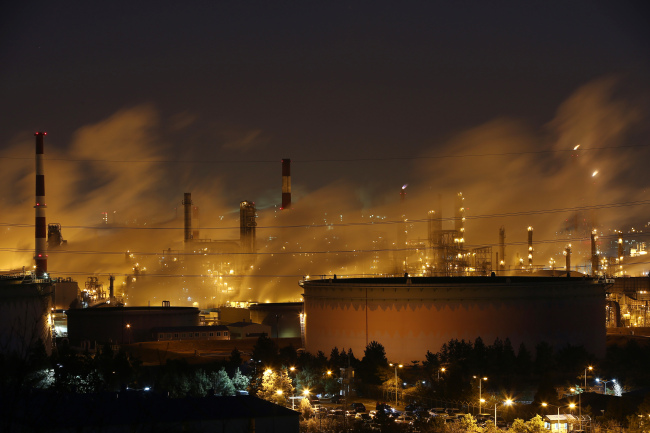Refiners diversify sources of crude, seek new markets
By Korea HeraldPublished : March 12, 2015 - 19:34
South Korean refiners, who suffered their worst ever performance last year, are diversifying from their traditional crude suppliers in the Middle East while seeking new export markets for their oil products.
GS Caltex, the country’s No. 2 refiner, started importing crude oil from Mexico for the first time in 24 years this month as part of efforts to reduce its dependence on Middle East oil and inventory loss.
“Finding sources for cheaper crude oil is the urgent priority amid a high level of uncertainty over tight cracking margins,” a GS Caltex official said. “We are seriously considering further import of crude oil outside of the Middle East,” he said.
In September last year, the company received the first cargo of 400,000 barrels of condensate from the United States and 800,000 barrels of Alaskan crude in October.
GS Caltex, the country’s No. 2 refiner, started importing crude oil from Mexico for the first time in 24 years this month as part of efforts to reduce its dependence on Middle East oil and inventory loss.
“Finding sources for cheaper crude oil is the urgent priority amid a high level of uncertainty over tight cracking margins,” a GS Caltex official said. “We are seriously considering further import of crude oil outside of the Middle East,” he said.
In September last year, the company received the first cargo of 400,000 barrels of condensate from the United States and 800,000 barrels of Alaskan crude in October.

Other industry players are looking for cheap spot purchases as well after posting their worst-ever performance in 2014 due to the freefall in prices which hurt the value of their crude inventories. The combined operating loss of the three refiners ― SK Innovation, GS Caltex and S-Oil ― reached 2.6 trillion won ($2.39 billion) last year.
SK Innovation, the largest refiner in Korea, bought 2 million barrels of Brent, a blend of four North Sea crude oils, while Hyundai Oil Bank significantly reduced its imports of crude oil from the Middle East since last year.
The only refiner which continues to rely on the Middle East is the nation’s third-biggest refinery firm S-Oil as the world’s largest crude exporter, Saudi Aramco, is its biggest shareholder.
South Korea imported 927.52 million barrels of crude in 2014, data from state-run Korean National Oil Corp. showed. Imports from the Middle East accounted for 83.97 percent at 778.92 million barrels.
Along with the effort to diversify their crude oil sources, refinery firms are also trying to enter new export markets to sell their petroleum products such as gasoline, kerosene and bunker oil.
This is because China, the biggest export market for Korea’s refinery industry, has drastically slashed its imports of Korean oil products and is expanding domestic refinery facilities to meet its own needs.
“It’s essential, not optional for local refiners to make inroads into new markets by having a competitive edge in both price and quality through modernized facilities amid an oversupply in the petroleum product market,” said Jung Yong-hun, a researcher at Korea Energy Economics Institute.
Last year, SK Innovation sold 29.35 million barrels of gasoline and diesel, about 30 percent of the firm’s total exports, to Indonesia, where demand for oil products is rapidly increasing as the country lacks refineries.
Australia is another market Korean refiners are keeping their eyes on. Local refiners exported 4.75 million barrels of oil products in January, up 169 percent from a year earlier.
By Park Han-na (hnpark@heraldcorp.com)
-
Articles by Korea Herald








![[Weekender] Pet food makers bet big on ‘recession-free’ pet food market](http://res.heraldm.com/phpwas/restmb_idxmake.php?idx=644&simg=/content/image/2024/05/10/20240510050754_0.jpg&u=20240511163252)










